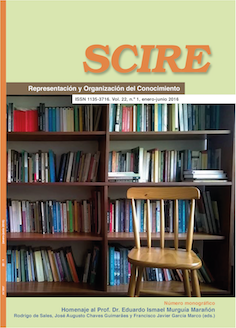Library classification and archive classification: diferences and similarities in knowledge organization
DOI:
https://doi.org/10.54886/scire.v22i1.4301Keywords:
Classification theory, Classification, Bibliographic classifications, Archival classifications, Comparative analysisAbstract
Among the several forms of knowledge organization, classification occupies a prominent position as it consists of one of the oldest ways of organizing knowledge. In Library and Archival Science, classifications have unique features and functions. This article discusses library and archival classifications from the perspective of the knowledge organization provided by these classifications, in order to present and reflect on their similarities and differences. It is an eminently theoretical research that contextualizes such classifications in their historical and conceptual aspects in order to provide a comparative scenario between them. Thus, its main objective is to highlight the differences and similarities between both classifications through a theoretical and comparative methodological approach. The results show that both classifications are similar with regard to the intellectual nature, the theoretical principles on which they are based, the kinds of relationships they support and the representation of concepts. However, they are different with regard to the types of classified knowledge, the aspects of concepts, the generated products and the uses that are made of them. We conclude that, once taken in account the similarities and differences between these types of classifications, they can and should be studied together, united by their classificatory principles.
Downloads
Downloads
Published
How to Cite
Issue
Section
License
Copyright (c) 2016 Authors retain their copyright, but transfer the exploitation rights (reproduction, distribution, public communication and transformation) to the journal in a non-exclusive way and guarantee the right to the first publication of their work to the journal, which will be simultaneously subjected to the license CC BY-NC-ND. Authors take whole personal responsibility on fulfilling all the appropiate ethical codes and laws, and obtaining all the necessary copyright permissions regarding their articles. Institutional and self- archiving is allowed and encouraged.

This work is licensed under a Creative Commons Attribution-NonCommercial-NoDerivatives 4.0 International License.
© 1996- . Authors retain their copyright, but transfer the exploitation rights (reproduction, distribution, public communication and transformation) to the journal in a non-exclusive way and guarantee the right to the first publication of their work to the journal, which will be simultaneously subjected to the license CC BY-NC-ND. Authors take whole personal responsibility on fulfilling all the appropiate ethical codes and laws, and obtaining all the necessary copyright permissions regarding their articles. Institutional and self- archiving is allowed and encouraged.




